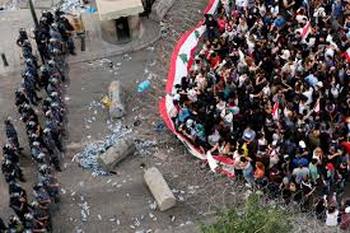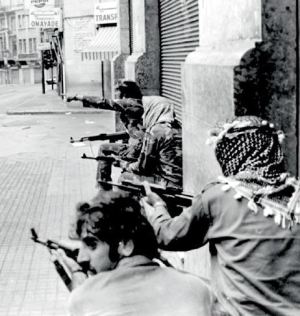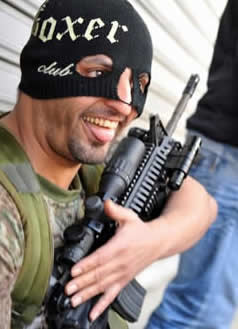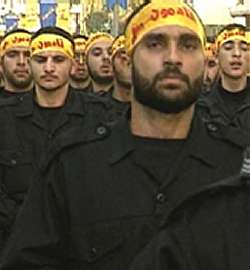by Kirill Semenov
[REGNUM] On November 26, Israeli Prime Minister Benjamin Netanyahu announced that his security cabinet had approved a ceasefire between Israel and Hezbollah.

The prime minister did not elaborate on the terms of the ceasefire or the date it would come into effect. He said the duration of the ceasefire would depend on how events unfold in Lebanon. " We will ensure compliance with the agreement and respond harshly to any violations. We will continue to work together until victory," he said.
Netanyahu stressed that Hezbollah is no longer "the same" as it was before the war: "We have set them back decades." He also promised to focus on confronting Iran and continuing the war with Hamas.
Obviously, this decision was not easy for the head of the Israeli cabinet, which was under external pressure. It was the administration of US President Joe Biden that finally managed to convince Netanyahu to agree to a truce.
Although it was much easier to do this than in Gaza. Many in Israel understood that the war in Lebanon was reaching a dead end, and new major successes were unlikely to be forthcoming, so now was the very chance to put an end to it, even if not quite a victorious one. At the very least, there was a reason to declare success.
However, it should be noted that there were certainly no fewer opponents of this decision in Israel from the very beginning than supporters. Many are not talking about success, but about “giving up the game” and even “capitulation.”
But Israel appeared to be forced to the negotiating table after Washington warned that its failure to reach an agreement would prompt the United States to renounce its veto over a UN Security Council resolution that would have demanded a ceasefire on far less favorable terms and with international legal consequences for Tel Aviv if it refused to comply.
The hardening of the US position was prompted by fears of a regional escalation that threatened to draw Iran, Hezbollah's main ally, into the conflict. So the White House has recently made efforts to persuade Netanyahu's government to accept the deal. France has joined the Americans, and President Emmanuel Macron has stepped up contacts with Lebanese political forces over which Paris retains influence.
"Today's agreement will end the fighting in Lebanon and secure Israel from the threat posed by Hezbollah and other terrorist organizations operating from Lebanon. This agreement will create the conditions for the restoration of lasting calm and allow residents of both countries to safely return to their homes on both sides of the Blue Line," the US-French joint statement on the deal said.
Paris and Washington also said they would work with Israel and Lebanon to ensure the agreements are fully implemented and respected, and would "lead and support international efforts to build the capacity of the Lebanese armed forces" and "economic development throughout Lebanon to promote stability and prosperity."
Iran, in turn, has also signaled that it is ready to conclude a ceasefire and will push Hezbollah to do so. In return for acceptable ceasefire conditions, Tehran has likely decided to postpone or even abandon a retaliatory strike against Israel.
Tehran also did not object to “separating the fronts” of Lebanon and Gaza for the sake of a deal that would not only allow interaction with the new American administration of Donald Trump to begin on a positive note, but would also be able to reduce the risks of Hezbollah losing its influence in Lebanon, which would preserve not only its military potential, but also its future on the Lebanese political scene.
The Party of God, its Lebanese partners, and its rivals supported the cessation of hostilities and, in fact, pushed the movement to accept the agreement. It was not without “blackmail and threats.” The decision was no less difficult for Hezbollah than for Israel. Finally, Lebanese Deputy Parliament Speaker Elias Bou Saab said that the ceasefire was approved in Beirut after Hezbollah authorized its ally from the Shiite Amal Party and Parliament Speaker Nabih Berri to conduct the negotiations.
However, Hezbollah has already made reservations that would allow the movement to withdraw from the ceasefire. They said they had not seen the text of the final version of the ceasefire agreement with Israel.
“After reviewing the agreement signed by the enemy (Israeli – Ed.) government, we will see if there is a correspondence between what we stated and what the Lebanese officials agreed on,” the movement reported.
The pre-approved agreement is in line with UN Security Council Resolution 1701, which ended the 36-day war between Israel and Hezbollah in 2006 but was never fully implemented. In fact, the resolution's lack of new input and retention of the old name without adding any plus signs to its numbers allows Hezbollah to save face.
The Israel Defense Forces (IDF) is now expected to withdraw its troops entirely from southern Lebanon. Hezbollah is also expected to withdraw its units and heavy weapons north of the Litani River, about 25 kilometers from the border.
During the 60-day transition period, the Lebanese army will be deployed in the border area along with UN peacekeeping forces. All border disputes over the Blue Line, which serves as the border, will be discussed after 60 days and after the withdrawal of Israeli and Hezbollah troops.
The implementation of the agreement will be monitored by a US-led oversight mechanism, which will act as an arbitrator in case of violations. Although the guarantor clause is not formally part of the deal, it is reportedly intended to ensure Israel has a free hand if Hezbollah is found to be maintaining or reintroducing forces south of the Litani.
PYRRHIC VICTORY
Of course, such an outcome can be declared a success for Israel. But it is obvious to many that this is not a victory, but only a temporary respite that both Hezbollah and the IDF are using. The latter is also extremely important. The IDF is extremely exhausted, and this is directly called one of the weights on the scale that tipped Netanyahu toward a truce.
"Israel will welcome the chance to rest its tired ground forces and reservists, and to repair equipment, replenish ammunition and stock up on supplies. It will also welcome the direct involvement of the US, its main ally, in mediating breaches," The Guardian writes.
Israel's success can also be seen in Hezbollah's rejection of the demand that a ceasefire in Lebanon be synchronized with and dependent on a suspension of hostilities in the Gaza Strip. However, this possibility cannot be discounted. Even if a ceasefire is established in Lebanon, the lack of progress in Gaza on a ceasefire could lead to the collapse of the agreements.
There are serious doubts that Israel is really interested in achieving peace in Palestine. In fact, a new Zionist project of creating Jewish settlements and permanent occupation of the enclave is currently being openly discussed in the country.
While it is not the official position of Israel's leadership, senior defense officials recently told Haaretz that the government intends to annex large swaths of Gaza rather than negotiate an end to the war.
On the other hand, despite its apparent success in “disengaging” the Gaza and Lebanon fronts, before the deal was accepted, it provoked ire from the most radical wing of Netanyahu’s coalition.
Thus, the far-right National Security Minister Itamar Ben Gvir on Monday called the deal a “historic mistake” that failed to achieve the main goal of the war: the return of displaced Israelis to their homes in the north. Ben Gvir was also the “breakwater” against which all attempts to reach a ceasefire between Israel and Hamas in the Gaza Strip were broken. But this time, his efforts did not lead to results.
Mayors of Israel's northernmost communities were also outraged by reports that Netanyahu's government intended to approve the deal, with one calling it a "surrender agreement" and a "disgrace of historic proportions."
National Unity Party leader Benny Gantz also spoke out against the deal, saying that “the current withdrawal of troops and the dynamics created create difficulties for us and will facilitate the reorganization of Hezbollah.”
Former Prime Minister Naftali Bennett also said the agreement "does not address any of the three threats that the people of the north face, as reported," referring to possible Hezbollah infiltration, direct ATGM and close-in strikes, and deep-launch rocket fire.
He said this is possible because the agreements do not include the creation of a buffer zone where Hezbollah and the Lebanese government are prohibited from rebuilding homes and buildings that could be used as shelters for rocket attacks or as undetected staging areas for sabotage groups.
Thus, Israel fears that Hezbollah will use the time allotted for the ceasefire to regroup and recuperate. It is not possible to expect the “Party of God” to voluntarily disarm, as Resolution 1701 envisaged, so it will continue to be an existential threat to Israel.
Hezbollah has retained its military potential, having lost 1,660 fighters since October 8, 2023, including those killed in Syria, which is generally not so critical for the movement. And the high-profile raid of the IDF's 91st Division on the Litani River on the eve of the approval of the deal should be viewed as a significant event only with a big caveat.
Israeli forces reached the river where it comes closest to the Blue Line in the Golan Heights. The distance from the border to the river in this section is only 3 km, not the average 20-25 km along its course in the south.
That is, in military terms, Israel's successes in the current war are the least tangible compared to past large-scale clashes, despite the killing of Hezbollah's top leadership.
In the first Lebanon war in 1982, the Israelis were able to reach Beirut. In the second, they reached the Litani River at a distance of 25 km from the border. In the third, they managed to penetrate only 3 km, and only in one small area on the Golan Heights side.
HEZBOLLAH AND IRAN NOT READY TO ADMIT DEFEAT
It is clear that the Party of God could have continued to hold back the IDF's attempts to advance into Lebanon, but the barbaric bombing of Lebanese cities by the Israeli Air Force, in which civilians were killed every day, increased the pressure on Hezbollah from the country's population and political forces.
Thus, in Lebanon, about 100,000 residential buildings were destroyed, 37 towns and villages were turned into ruins, more than 3,000 civilians were killed, and 1.2 million Lebanese became refugees and internally displaced persons.
Naturally, not only Hezbollah's political opponents, but also its partners did not want Lebanon to turn into dead ruins like Gaza, where women and children suffered the most, and every day hundreds of residents were buried under the rubble of their homes, which became mass graves.
The IDF used this strategy, essentially taking the entire population of Lebanon hostage. The “suspicion” that a Hezbollah functionary was hiding in a multi-story building was enough to destroy not only that building and all its inhabitants, but also an entire neighborhood and its entire population.
At the same time, Israel did not divide the members of the “Party of God” into civilians and soldiers, and killed Lebanese day after day in the expectation that Hezbollah would be forced sooner or later to agree to Israeli demands, transmitted with the help of the United States.
Hezbollah now faces a difficult choice, since full compliance with these demands could deprive it of its future. However, an important positive outcome for it in the current phase of the conflict is that it was able to fight off a much more powerful enemy with the most modern weapons.
In addition, the movement demonstrated particular resilience. The loss of virtually all of its leadership did not lead to its collapse or loss of combat capabilities. The "Party of God" fully retained its missile potential and continued to strike Israel, including Tel Aviv, until the very end.
"The first result of this agreement is that the resistance remains and that its capabilities, as recent months have shown, are not linked to its location south or north of the [Litani] River," Lebanese outlet Al-Akhbar reported.
In other words, it is a question of Hezbollah not having a problem returning to the south and attacking Israel if the situation changes. In fact, the Israelis are afraid that the sword that remains in the hands of the Party of God has only been lowered and can once again be brought down on the northern regions of the country.
The main problems of Hezbollah and Iran in the current conditions are now aid to Hamas and the need to restore the authority of the "Party of God" in Lebanon. Hezbollah dragged Lebanon into its war under the slogans of supporting Gaza, brought death and destruction to the country, but did not achieve its goal: a truce was concluded only in Lebanon, while Hamas and Palestine remain under attack. And was it worth starting a campaign because of this?
At the same time, from a military point of view, it was justified in any case. The fact that Hamas was able to survive and continues to resist to this day is a great merit of Hezbollah. It did not allow Israel to throw all its forces at Gaza, pulling the most combat-ready units to the north. But for many Lebanese, this is small consolation, especially since the future of Gaza remains uncertain.
Therefore, there are big risks that the current ceasefire will be just a short respite in a big war. The new Trump administration, of course, would like everything to end there. Iran, which is ready to resume dialogue with the Republicans, wants the same.
But there are many factors that could bury these intentions. And the main one is Netanyahu and his determination to crush Gaza at any cost, regardless of civilian casualties.

 ...Formerly inhabited by hardy Phoenecian traders, its official language is now Arabic, with the usual unpleasant side effects. ...
...Formerly inhabited by hardy Phoenecian traders, its official language is now Arabic, with the usual unpleasant side effects. ... ...an Iranian colony situated on the eastern Mediterranean, conveniently adjacent to Israel. Formerly inhabited by hardy Phoenecian traders, its official language is now Arabic, with the usual unpleasant side effects. The Leb civil war, between 1975 and 1990, lasted a little over 145 years and produced 120,000 fatalities. The average length of a ceasefire was measured in seconds. The Lebs maintain a precarious sectarian balance among Shiites, Sunnis, and about a dozeen flavors of Christians. It is the home of Hezbollah, which periodically starts a war with the Zionist Entity, gets Beirut pounded to rubble, and then declares victory and has a parade. The Lebs have the curious habit of periodically murdering their heads of state or prime ministers...
...an Iranian colony situated on the eastern Mediterranean, conveniently adjacent to Israel. Formerly inhabited by hardy Phoenecian traders, its official language is now Arabic, with the usual unpleasant side effects. The Leb civil war, between 1975 and 1990, lasted a little over 145 years and produced 120,000 fatalities. The average length of a ceasefire was measured in seconds. The Lebs maintain a precarious sectarian balance among Shiites, Sunnis, and about a dozeen flavors of Christians. It is the home of Hezbollah, which periodically starts a war with the Zionist Entity, gets Beirut pounded to rubble, and then declares victory and has a parade. The Lebs have the curious habit of periodically murdering their heads of state or prime ministers...
 ...The satrap of the Medes and the Persians in Leb...
...The satrap of the Medes and the Persians in Leb... ...
... [ALMASDARNEWS] Israeli Prime Minister Benjamin Netanyahu on Wednesday urged UN Secretary-General Antonio Guterres to slam Lebanon-based Hezbollah militant movement for digging transboundary tunnels leading to Israel and tighten sanctions against the group.
[ALMASDARNEWS] Israeli Prime Minister Benjamin Netanyahu on Wednesday urged UN Secretary-General Antonio Guterres to slam Lebanon-based Hezbollah militant movement for digging transboundary tunnels leading to Israel and tighten sanctions against the group.